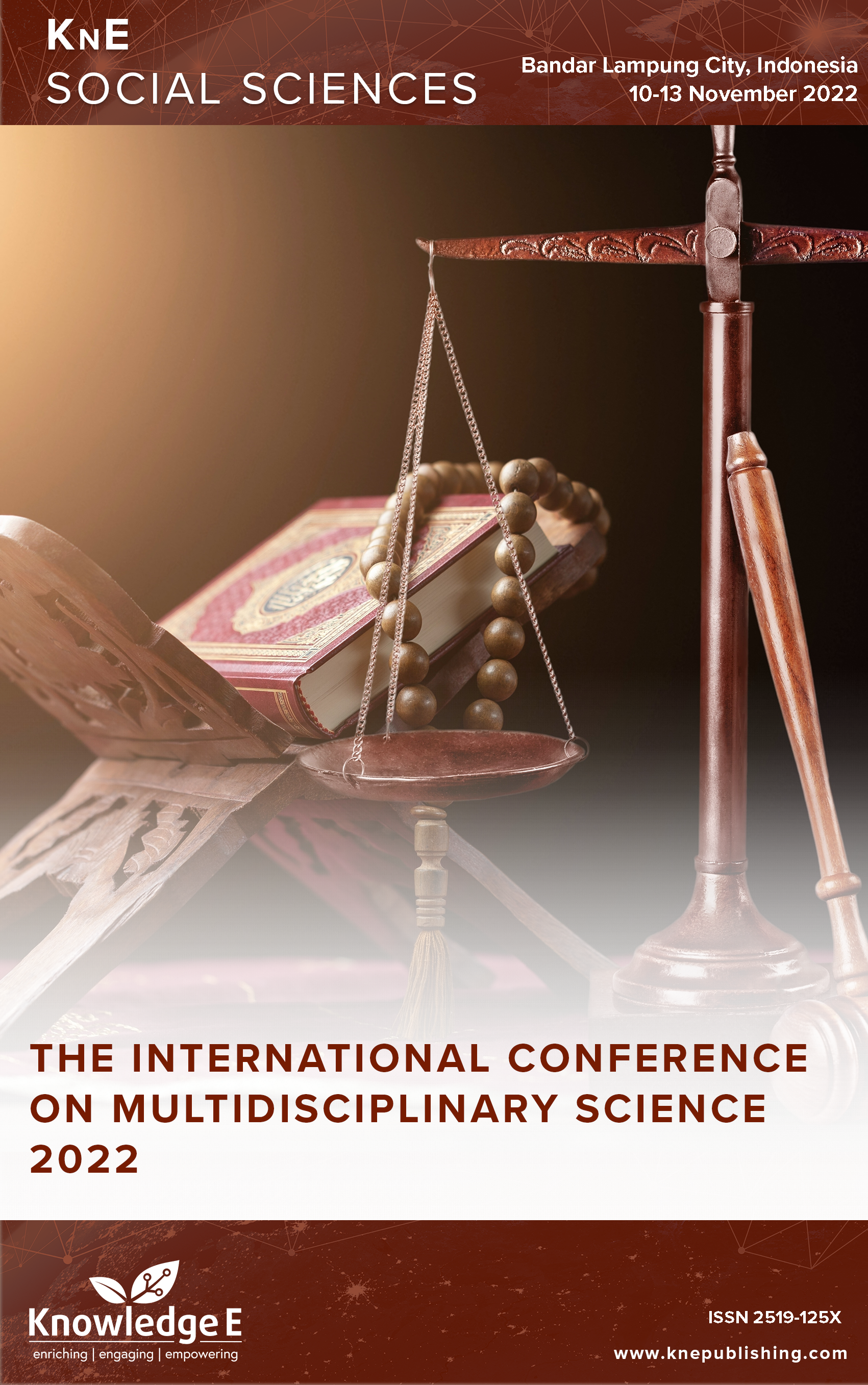Exploring the Flexibility of Islamic Law in Facing Global Humanitarian Issues: A Case Study of Lampung Province, Indonesia, in the Context of the COVID-19 Pandemic
DOI:
https://doi.org/10.18502/kss.v8i16.14054Abstract
This study explores Islamic law’s flexibility in addressing global humanitarian issues, particularly the COVID-19 pandemic in Lampung Province, Indonesia. The research investigates how Islamic teachings can be applied flexibly to benefit humanity through a literature review and field study methods. The study found that the policies implemented by the local and central governments in Lampung Province align with the values of religious teachings, particularly in safeguarding the human soul (hifdz nafs), the highest value before property and religion. The policy limits people’s worship and social and economic activities, but these restrictions are necessary to prevent and overcome the spread of the virus. This study concludes that religious teachings are flexible and can be applied creatively to address humanitarian crises, including the COVID-19 pandemic.
Keywords: Flexibility of Islamic law, Global humanitarian issues, COVID-19 pandemic.
References
Ahmed K, Bukhari M A, Mlanda T, Kimenyi J P, Wallace P, Okot Lukoya C, et al. Novel approach to support rapid data collection, management, and visualization during the COVID-19 outbreak response in the World Health Organization African Region: Development of a data summarization and visualization tool. JMIR Public Health and Surveillance. 2020;6(4)e20355. https://doi.org/10.2196/20355
Aibak K. Metodologi hukum Islam. Pustaka Pelajar; 2008.
Ash-Shiddieqy H. Falsafah hukum Islam (3rd ed.). Bulan Bintang; 1993.
As-Syatibi A I. Al-muwafaqat fi ushul al-syariah. Mustafa Muhammad.(n.d.).
Auda J. Membumikan hukum Islam melalui maqasid syariah, terj. Rosidin dan Ali Abd el Mun’im. Mizan Pustaka. 2015.
Diana Farida Chandrawati. Penerapan Sanksi Pidana Mati Terhadap Pelaku Tindak Pidana Korupsi Pada Masa Pandemi Covıd-19 Dalam Perspektif Hukum Pidana. Universitas Pasundan. 2022.
Goniewicz K, Khorram-Manesh A, Hertelendy A J, Goniewicz M, Naylor K, Burkle F M. Current Response and Management Decisions of the European Union to the COVID-19 Outbreak: A Review.Sustainability.2020;12(9):3838. https://doi.org/10.3390/su12093838
Hambali A, Adhariani D. Sustainability performance at stake during COVID- 19 pandemic? Evidence from Sharia-compliant companies in emerging markets. Journal of Islamic Accounting and Business Research.2023;14(1):80– 99.https://doi.org/10.1108/JIABR-01-2022-0014
Heikal Ismail M, Ghazi T I M, Hamzah M H, Manaf L A, Tahir R M, Mohd Nasir A, Ehsan Omar A. Impact of movement control order (MCO) due to coronavirus disease (COVID-19) on food waste generation: A case study in Klang Valley, Malaysia. Sustainability. 2020;12(21):8848. https://doi.org/10.3390/su12218848
Hidayat B, Putri AS, Ophiyandri T, Istijono B, Amaratunga D, Haigh R, de Silva A. Analysis of the government regulations on COVID-19 pandemics in Indonesia: İmplementation and challenges. E3S Web of Conferences. 2021;331:01016. https://doi.org/10.1051/e3sconf/202133101016
Kalam A, Shano S, Khan MA, Islam A, Warren N, Hassan M M, Davis M. Understanding the social drivers of antibiotic use during COVID-19 in Bangladesh: Implications for reduction of antimicrobial resistance. PLOS ONE. 2021;16(12):e0261368. https://doi.org/10.1371/journal.pone.0261368
Katsir I. Terjemahan singkat tafsir Ibnu Katsier / diterjemahkan oleh H. Salim Bahreisy H. Said Bahreisy. PT. Bina Ilmu. 1990.
Kousi T, Mitsi L-C, Simos J. The early stage of COVID-19 outbreak in Greece: A review of the national response and the socioeconomic ımpact. Int J Environ Res Public Health. 2021;18(1):322. https://doi.org/10.3390/ijerph18010322
Kresna A, Ahyar J. Pengaruh physical distancing dan social distancing terhadap kesehatan dalam pendekatan linguistik. J Syntax Transform.2020;1(4):14–19. https://doi.org/10.46799/jurnal syntax transformation.v1i4.42
Mahmud A, Ding D, Hasan Md M. Corporate social responsibility: Business responses to coronavirus (COVID-19) Pandemic. SAGE Open. 2021;11(1):215824402098871. https://doi.org/10.1177/2158244020988710
Mardani M. Hukum acara perdata peradilan agama dan mahkamah syariah. Sinar Grafika. 2010.
Mardani M. Hukum acara perdata peradilan agama dan mahkamah syariah. Sinar Grafika. 2010.
Mohd Riza N S, Md Ariffin MF, Hamdan MN, Ramli N. Halal food: A social responsibility on cartel meat issue in Malaysia. Food Res. 2022;6(3):92–100. https://doi.org/10.26656/fr.2017.6(3).277
Muhammad AZ. Ushul Fiqh, Terjemahan Saefullah Ma’sum et al. (6th ed.). Pustaka Firdaus. 2000.
Muhyiddin. Covid-19, New Normal dan Perencanaan Pembangunan di Indonesia. 2020. https://journal.bappenas.go.id/index.php/jpp/issue/view/11
Muhyiddin M, Nugroho H. A year of Covid-19: A long road to recovery and acceleration of Indonesia’s development. Jurnal Perencanaan Pembangunan: Indo J Develop Plan. 2021;5(1):1–19. https://doi.org/10.36574/jpp.v5i1.181
Munawwir. Al Munawwir: Kamus Arab-Indonesia. Pustaka Progesif ; 1997.
Nurhayati N, Purnama TB. funeral processes during the COVID-19 pandemic: Perceptions among Islamic Religious Leaders in Indonesia. Journal of Religion and Health, 60(5), 3418–3433. https://doi.org/10.1007/s10943-021-01418-z
Parvin GA, Ahsan R, Rahman Md H, Abedin Md A. Novel coronavirus (COVID-19) pandemic: The role of printing media in Asian Countries. Front Commun. 2020;5. https://doi.org/10.3389/fcomm.2020.557593
Rabbani MR, Bashar A, Nawaz N, Karim S, Ali MAM, Rahiman HU, et al. Exploring the role of Islamic fintech in combating the aftershocks of COVID-19: The open social ınnovation of the Islamic Financial System. J Open Innov: Technol Market Complex. 2021;7(2):136. https://doi.org/10.3390/joitmc7020136
Shammi M, Bodrud-Doza Md, Islam ARMT, Rahman MM. Strategic assessment of COVID-19 pandemic in Bangladesh: Comparative lockdown scenario analysis, public perception, and management for sustainability. Environ Develop Sustain. 2021;23(4):6148–6191. https://doi.org/10.1007/s10668-020-00867-y
Ten Have H. Global bıoethıcs: Transnatıonal experıences and ıslamıc bıoethıcs. Zygon®.2013;48(3):600–617. https://doi.org/10.1111/zygo.12035
Tune SNBK, Islam BZ, Islam MR, Tasnim Z, AhmedSM. Exploring the knowledge, attitudes, practices and lived experiences of frontline health workers in the times of COVID-19 : A qualitative study from Bangladesh. BMJ Open. 2022;12(1):e051893. https://doi.org/10.1136/bmjopen-2021-051893
Tuti RWD, Nurmandi A, Zahra AA. Handling COVID-19 in the capital city of Jakarta with innovation policy: The scale of social restrictions policy. Heliyon. 2022;8(5):e09467. https://doi.org/10.1016/j.heliyon.2022.e09467
van Barneveld K, Quinlan M, Kriesler P, Junor A, Baum F Chowdhury A, et al. The COVID-19 pandemic: Lessons on building more equal and sustainable societies. Econ Labour Relations Rev. 2020;31(2):133–157. https://doi.org/10.1177/1035304620927107
Wahyudi H, Asy’ariati FA. Ketimpangan Wilayah Antar Kabupaten/Kota di Provinsi Lampung. Jurnal Studi Ilmu Sosial Dan Politik. 2022;1(2).
Wehr H, Cowan JM. A dictionary of modern written Arabic. bnpublishing.

